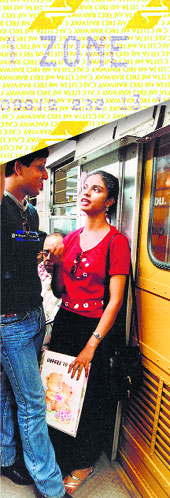 |
It was Monday morning and, as usual, Mitali Chakraborty was running late. But instead of being able to make her way to office as quickly as possible, she got delayed further, thanks to the multi-ride Metro Railway ticket she had bought four days ago. Storming her way to the ticket supervisor’s room in Belgachhia, Chakraborty had no option but to get a refund for her jammed ticket.
Chakraborty is one of those who believe that Metro Railway’s multi-ride ticket is a time saver, one that spares you the hassle of having to queue up at the ticket counter. The added incentive is that it is cheaper, at nearly half the price of a daily ticket for a one-way ride.
The incentive is very well, provided you can avail of the ticket. But as it so happens, instead of saving time, ironically the ticket often adds to a commuter’s woes, as it did in Chakraborty’s case when it got stuck at the entry point. Having got a refund, she headed for the ticket counter to buy yet another ticket, vowing never to buy a multi-ride ticket.
Chakraborty isn’t the only one. Says Jayita Das, an exasperated college student, “I use a multi-ride ticket to travel from Tollygunge to Rabindra Sadan. But after every 12-15 rides, my ticket becomes invalid. The authorities say the ticket should be kept away from cell phones and magnetic fields. But that hardly helps.”
Senior PRO, Metro Railways, S.C. Banerjee, is however, on the defensive, “We sell close to 1,000 magnetic tickets every day and less than 0.02 per cent need to be refunded,” he declares. “You are likely to get these complaints only from commuters who don’t handle their tickets properly. Some use it to wipe sweat, some use it as a toothpick. So how can you expect the ticket to function properly,” he asks.
Commuters, on their part, deny these charges. Says Sweta Kejriwal, a content writer, “I have tried everything possible to prevent my ticket from turning invalid, but nothing works.”
There seems to be a reason for that. As a ticket supervisor points out, on condition of anonymity, “The Metro monthly tickets are usually made of poor quality paper which is why no matter how much you try, your ticket is bound to get spoilt after 15 or 20 rides.” In fact, other Metro officials add, around 50 multi-ride tickets are refunded every day.
Explains Bonnie Wilson, manager, customer care, Eagle Press Private Limited, Chennai, which manufactures magnetic tickets for the Metro Railway, Calcutta, the magnetic tickets are made as per Metro Railway’s requirements. “One of the requirements is that the paper has to be 230 gms (grams/square centimetre),” says Wilson, adding, “to date, there have been no complaints about the quality of the tickets”.
The ticket operation process is fairly simple as Pinaki Chowdhury, systems head, NIS Management Private Limited, explains. “When the ticket is bought, the destination code, the number of people travelling, the number of rides and the date is punched into the magnetic strip. When you insert the ticket into the machine, the reader in the machine tallies the information and the lock opens and the spears get rolling. When you exit a station, this coding is destroyed by the automatic machine to prevent reuse.”
While Metro authorities insist that commuters keep their cell phones away from tickets, that need not necessarily be the only reason for a ticket to turn invalid. As Chowdhury explains, “It’s unlikely for the cell phone to get close enough to the ticket to actually cause a problem. Only if you took your cell phone apart, found the magnet and placed your Metro ticket right on it would it be affected; otherwise it’s quite unlikely.”
There are other factors, though, that can cause damage to a ticket. For one, the ticket reader may not function properly if the automatic machines are not well-maintained.
Besides, spare parts for these machines are not easily available in the market and that makes it hard to repair them. And finally, the machines may be overused, which in most cases, is likely to affect the entire process of reading a ticket.
Commuters needn’t lose hope. Metro officials point out, smart cards are a better option. But while they serve the same purpose as that of a multi- ride ticket, a deposit of Rs 100 is mandatory which is refundable. However, because these are contact-less cards, they last longer.
Moreover, smart cards are rechargeable, which means you can reuse you card by refilling it, unlike magnetic tickets which have to be bought at regular intervals. “Smart cards don’t get soiled or broken easily. In fact, we have very few smart card users complaining about their cards or asking for a refund,” says R.D. Kamat, ticket supervisor at Tollygunge station.
While that may be true to some extent, it isn’t as though smart cards are problem-free. Says Shreosi Banerjee, a B.Ed student, “I travel from Tollygunge to Maidan every day, so I opted for a smart card. But, sometimes when I touch the smart card against the automatic machine, the machine at the ticket supervisor’s room shows ‘entered’ but the machine at the station reads an ‘invalid’ card. So there is probably a software problem even in the smart cards issued.”
Till such time that these problems get sorted out, commuters can only bank on their luck or better still, a daily ticket.
Dos and don’ts
• Keep your cell phone away from your multi-ride ticket.
• Keep it away from any metallic field.
• Store it between hard covers to prevent it from breaking or bending.
• Don’t clutch it in your hand. Sweat and rain can soil your ticket.











